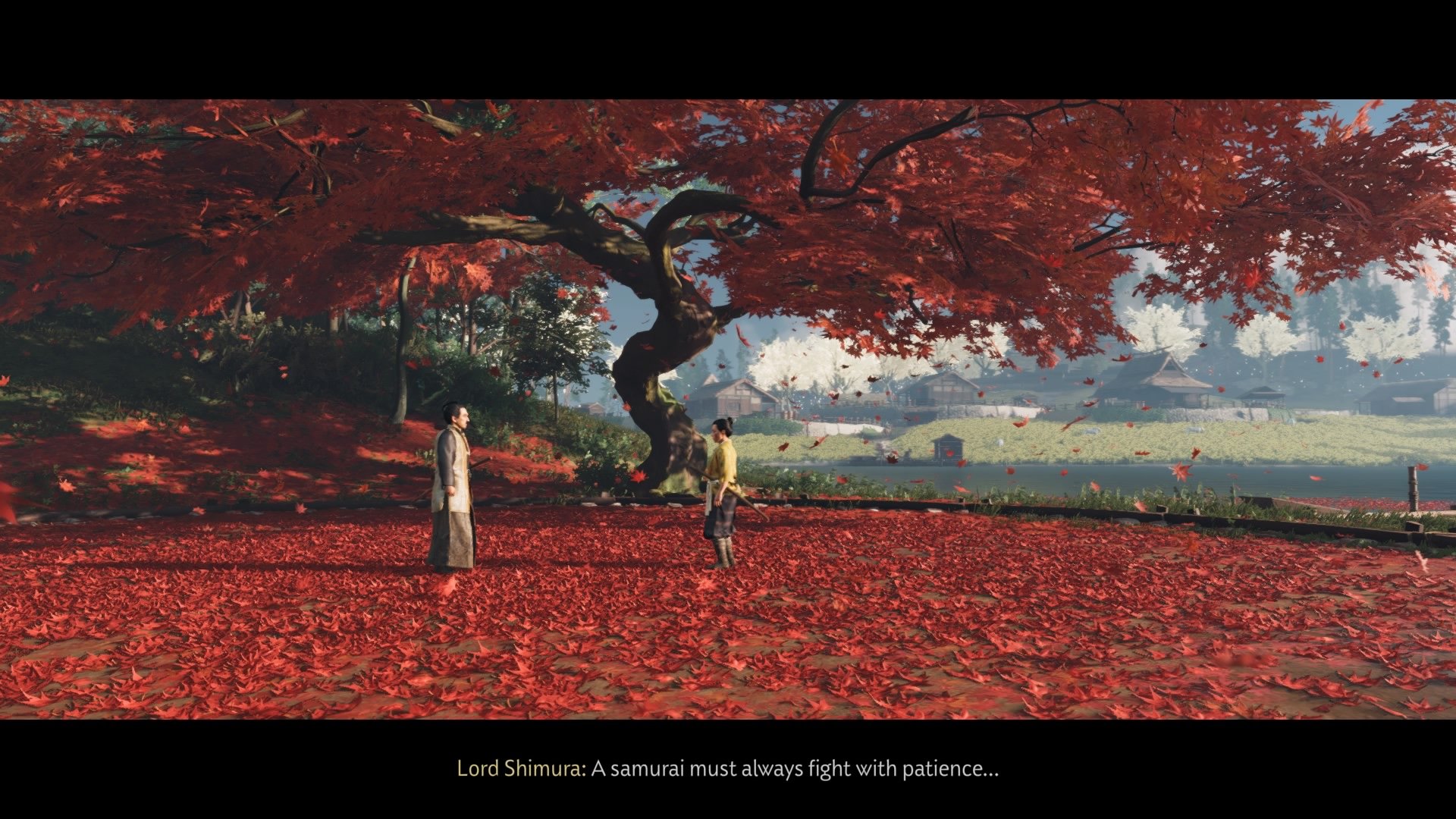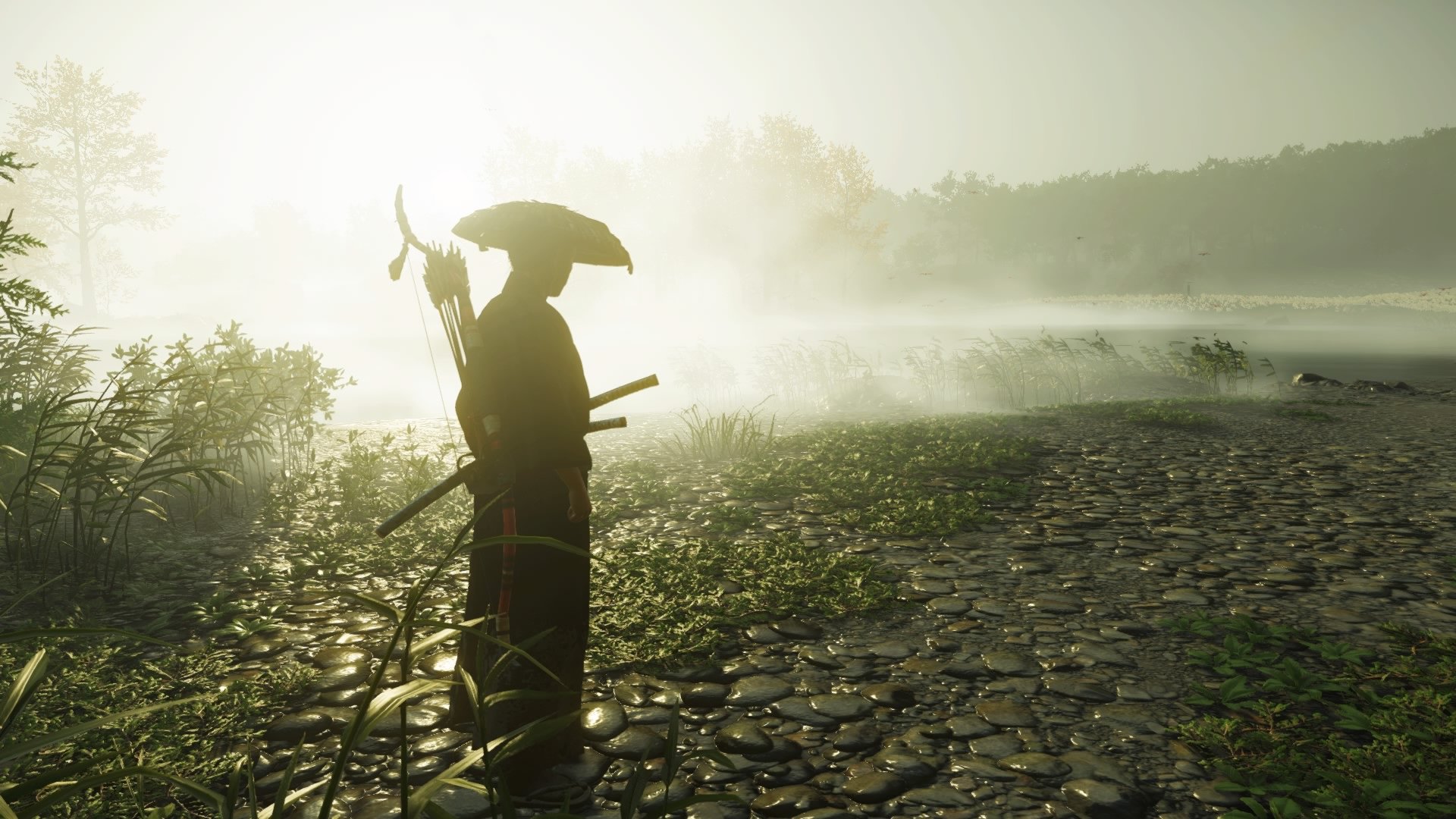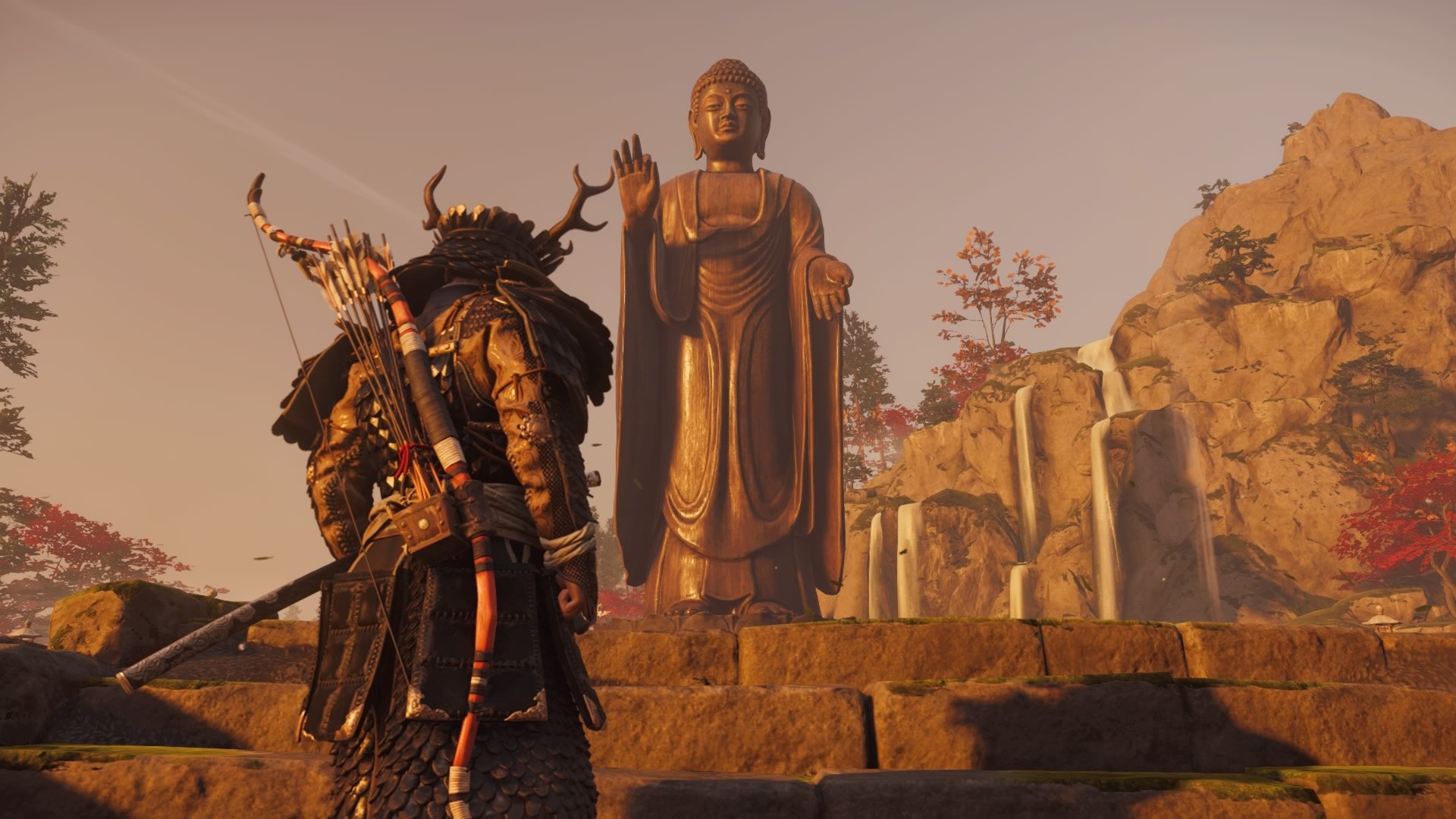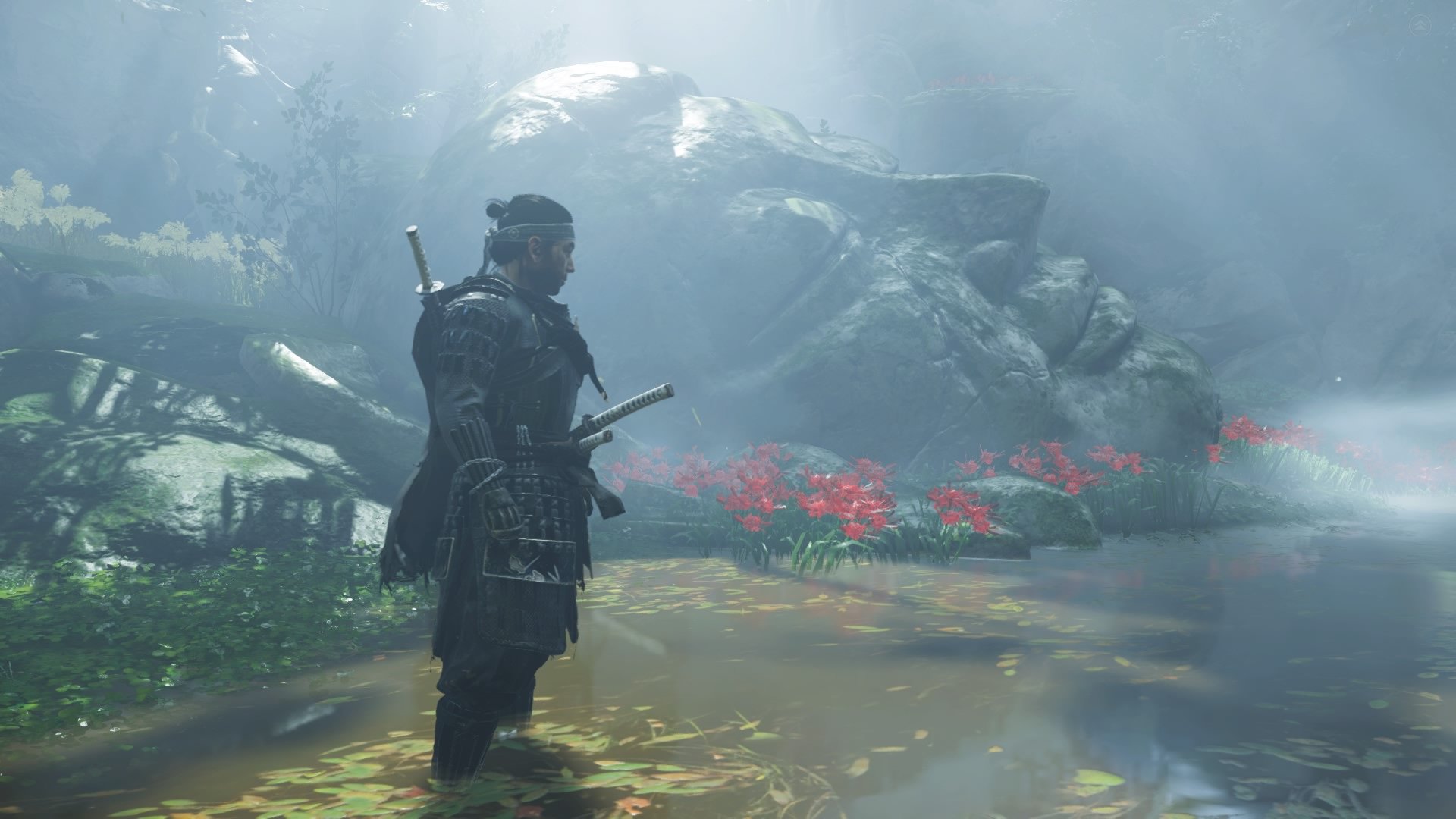Ghost of Tsushima review
Ghost of Tsushima is another excellent PlayStation-exclusive blockbuster. An open-world adventure with a massively epic story and top-notch cinematic storytelling, this one delivers on all the areas you’d expect from playing God of War, Marvel’s Spider-Man & Spider-Man: Mile Morales, or The Last of Us: Part II. Except now we’re in feudal Japan, so we can be fully immersed in samurai, ronin, ninja, and uh…haikus, I guess.
The narrative follows Jin Sakai’s battle with invading Mongolian forces, and takes our hero on a journey from honorable samurai noble, to infamous ninja assassin. Throughout his story, Jin becomes disillusioned by the rigid constraints of samurai tactics and adopts more flexible guerrilla warfare methods. His decisions to ignore samurai rules of war bring him into direct conflict with his uncle, his mentor and surrogate father-figure, creating the main source of personal stakes for him in the drama.
The thing is, I wasn’t really interested in any of the noble samurai stuff from the very beginning. When I picked up Ghost of Tsushima, I was determined to play it as if it were a modern Tenchu game: all ninja, all the time. The first skills I used my technique points on were the stealth kills, called “assassination techniques” here. The first gear I upgraded to the maximum was the tanto, Jin’s dagger, which is used exclusively for assassinations. And I was a bit annoyed that the Ghost Armor—the badass ninja outfit that Jin wears on the game’s cover—doesn’t unlock until the end of Act II. (Although in hindsight, I guess I should have just rushed through the story missions until I got to that point.)
Eventually, after assassinating my way through hordes of Mongolian invaders, it finally dawned on me that Tsushima’s combat system is actually quite excellent. (At least, it becomes really good once you’ve upgraded Jin’s health and attack power a bit.) This meant that I didn’t necessarily have to run away every time I got spotted (as one does in Tenchu); standing my ground and fighting several attackers at once was really good fun and satisfying. Sure, I still generally opted for the stealth approach whenever given the option, but now I actually looked forward to the prospect of a fair fight from time to time.
The sword duels with various ronin really drove home how good the combat system is. In a duel, you are not allowed to use your Ghost weapons (smoke bombs, kunai, black powder grenades, that sort of thing) and must face your opponent on more-or-less level terms. This means you need to utilize Jin’s techniques appropriately, especially blocks and parries for normal attacks, and dodging out of the way of unblockable strikes. The one-on-one setup of duels makes the combat, as deep as it is, feel almost like a fighting game. It almost feels like Bushido Blade—except not at all—because fights in Bushido Blade are over after on solid strike, and here we have life bars.
The narrative in Ghost of Tsushima is masterfully told, with interesting twists and turns in its main tale, and surprisingly deep character arcs in the side-stories. The performances are also some of the best I’ve ever seen in a video game, an accomplishment which should probably split credit between the actors themselves and the technological feat of capturing their performances.
I even played the standard (non-Director’s Cut) version using Japanese voices, which meant that the actors’ lips did not match the audio I was hearing in my playthrough. Even in that case though, the story was great and the performances were legitimately moving. It was legitimately awesome stuff.
Now it must be said that in terms of visuals, Ghost of Tsushima is a real showstopper.
Even playing the original version on old-model PS4, it is genuinely staggering how beautiful this game is—both in turns of sheer fidelity and masterful artistic style. The landscapes, the sunsets, the wind & rain & snow, the glinting metal of armor & weapons, your horse galloping at full speed through an open field: everything here is flat-out gorgeous! Even Jin’s butt is a sight to behold, in particular when he slips naked into a soothing hot spring. I actually called my wife into the room just to see that…multiple times…
As I was getting into Ghost of Tsushima, my only complaint was that the game was just too damn big. As tends to be the case with open-world games, I looked at the map of the game world—with icons denoting points of interest all over the place—and I felt immediately overwhelmed. It was too big, with too much stuff to do! Viewing the map, it just all felt too much like work. And then I realized that I could zoom out…. As it turns out, I was only looking at the first island, less than half of the map overall. Now I really felt overwhelmed! Despite the seemingly oppressive scale of the world, I stuck with Tsushima. And I’m glad I did, because it really came around to win me over.
I enjoyed Tsushima so much, in fact, that I decided to finally do everything in the game. While I had never done so before, I decided this was the time to snag that elusive Platinum Trophy. If you take the time to clear every village and enemy base, and complete the main campaign, then there isn’t much more you need to do to collect all trophies. There’s an oddball trophy here and there—such as cosplaying Jin like Sly Cooper—but you’re likely to collect most of your trophies just by completing the game’s story.
Funnily enough in my case, the last trophy I needed was for winning a max-length standoff streak. For the uninitiated, a standoff is when Jin announces himself to a group of enemies, and then faces a single foe in a something of a quick-draw duel. If Jin is successful, he’ll fell his opponent in one blow, at which time a second attacker will try to strike. With good timing, Jin can take out multiple enemies this way. And by leveling-up skills and gear, you’ll be able to dispatch three, four, or five enemies in one go. But again, since I had been trying to play Tsushima like a Tenchu game, I had almost never attempted any standoffs at all. So the standoff streak achievement was final trophy I collected.
So yes, I whole-heartedly recommend playing Ghost of Tsushima. This game is just as good as you’ve heard—probably better, actually!—and it definitely deserves your time. Even if, like me, you go in determined to play like it a different type of game altogether, it will still be an incredibly rewarding adventure. Oh yeah, and you can pet the foxes! Beautiful.









